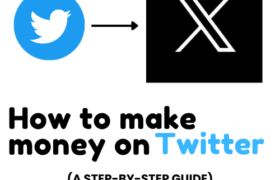Affiliate Marketing Without a Website: A Comprehensive Guide
Affiliate marketing is a popular way to earn money online by promoting products and earning commissions on sales. Traditionally, having a website is a common approach for affiliate marketers, but it’s not the only way. In this article, we’ll explore how you can succeed in affiliate marketing without a website.
Understanding Affiliate Marketing
Affiliate marketing involves promoting products or services offered by a company (the merchant) and earning a commission when someone makes a purchase through your referral link. This is typically tracked using unique affiliate links provided by the merchant or an affiliate network.
Why You Don’t Need a Website
While having a website can be advantageous, there are several reasons why you might choose to pursue affiliate marketing without one:
- Lower Initial Costs: Setting up and maintaining a website can be expensive and time-consuming.
- Quicker Setup: You can start promoting affiliate products immediately without the need for web development.
- Leverage Existing Platforms: There are numerous platforms with built-in audiences where you can promote your affiliate links.
Strategies for Affiliate Marketing Without a Website
- Social Media Marketing
Social media platforms like Facebook, Instagram, Twitter, and Pinterest have massive audiences. Here’s how to use them for affiliate marketing:
- Create Engaging Content: Post valuable and engaging content related to the products you’re promoting. This could be product reviews, how-to guides, or lifestyle posts showcasing the product in use.
- Use Affiliate Links: Embed your affiliate links in your posts, bios, or stories. Make sure to comply with each platform’s policies and disclose your affiliate relationship.
- Engage with Followers: Interact with your audience by responding to comments and messages. Building a strong relationship with your followers can increase trust and lead to higher conversion rates.
- YouTube Videos
YouTube is a powerful platform for affiliate marketing. Videos can demonstrate products in a way that text and images can’t.
- Create Product Reviews and Tutorials: Make videos reviewing products or showing how to use them. Include your affiliate links in the video description and mention them during the video.
- Optimize for SEO: Use relevant keywords in your video titles, descriptions, and tags to increase visibility.
- Engage with Your Audience: Encourage viewers to like, comment, and subscribe. Respond to comments to build a community around your channel.
- Email Marketing
Building an email list allows you to promote affiliate products directly to interested subscribers.
- Collect Email Addresses: Use lead magnets like free e-books, checklists, or exclusive tips to encourage people to subscribe to your email list.
- Send Valuable Content: Provide your subscribers with valuable content, including product recommendations and reviews with your affiliate links.
- Segment Your List: Segment your email list based on interests and behaviors to send more targeted and effective emails.
- Forums and Online Communities
Participating in forums and online communities can be an effective way to promote affiliate products.
- Join Relevant Communities: Look for forums, Reddit threads, and Facebook groups related to the niche of the products you’re promoting.
- Be Helpful and Authentic: Provide genuine help and advice. Avoid spamming and make sure your recommendations are relevant and valuable to the community.
- Share Your Links Thoughtfully: When appropriate, share your affiliate links in your posts or responses. Always disclose your affiliate relationship to maintain trust.
- Influencer Collaborations
If you have a good social media following or a strong presence in a particular niche, collaborating with influencers can amplify your reach.
- Partner with Influencers: Collaborate with influencers who align with your niche and have an engaged audience.
- Create Joint Content: Work together on content that showcases the affiliate products and provides value to the audience.
- Share Affiliate Links: Both you and the influencer can share the affiliate links, expanding the reach and potential conversions.

Tips for Success
- Choose the Right Products: Promote products that are relevant to your audience and that you genuinely believe in. This builds trust and increases the likelihood of conversions.
- Disclose Affiliate Relationships: Always disclose that your links are affiliate links. This is required by law and helps maintain transparency with your audience.
- Track Your Performance: Use tracking tools to monitor which platforms and strategies are generating the most conversions. Adjust your approach based on what works best.
- Provide Value: Focus on providing value to your audience. Whether it’s through helpful content, engaging videos, or insightful recommendations, the more value you offer, the more successful you’ll be.
Conclusion
Affiliate marketing without a website is not only possible but can be highly effective if done correctly. By leveraging social media, YouTube, email marketing, forums, and influencer collaborations, you can reach a wide audience and drive sales for the products you promote. Remember to focus on providing value, choose the right products, and always disclose your affiliate relationships to build trust and succeed in the long term.


























Wonderful work! This is the type of info that are supposed to be shared across the web. Shame on the search engines for not positioning this put up upper! Come on over and discuss with my website . Thanks =)
You made some clear points there. I looked on the internet for the subject matter and found most people will go along with with your website.
Nice blog here! Also your website loads up very fast! What web host are you using? Can I get your affiliate link to your host? I wish my web site loaded up as fast as yours lol